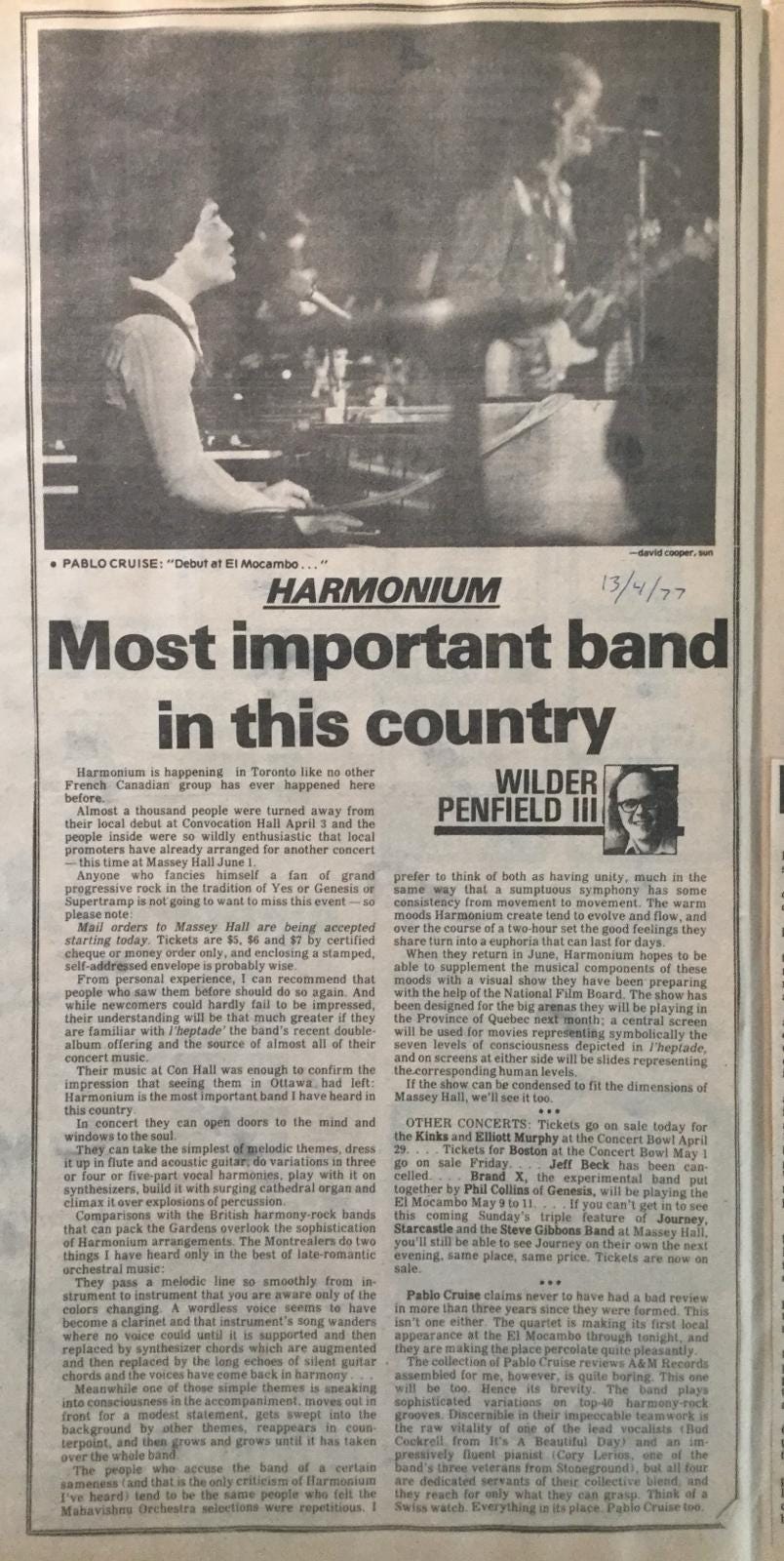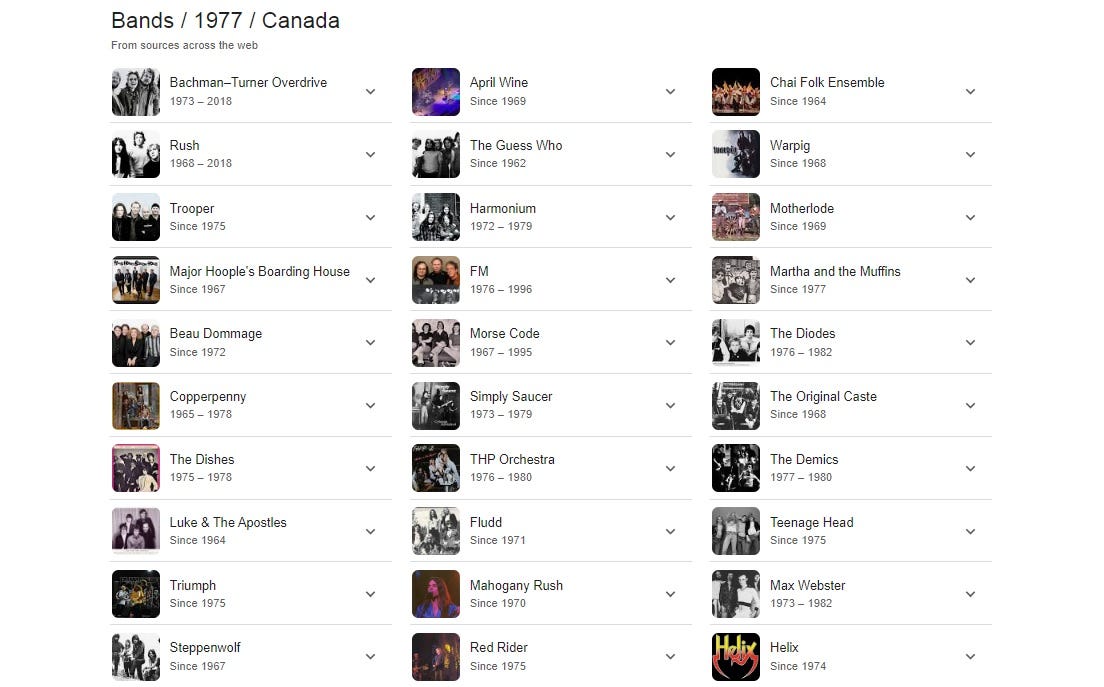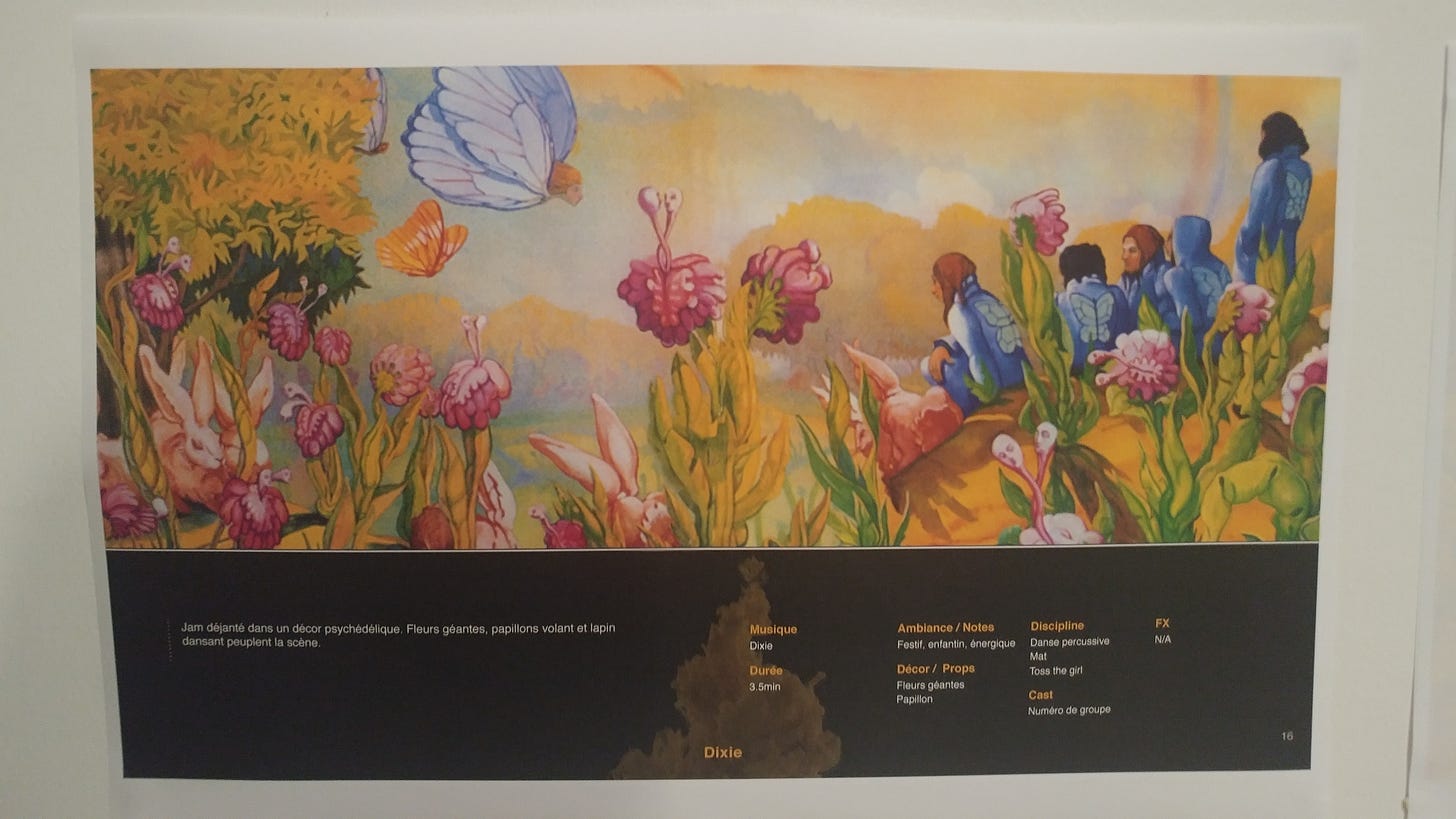In 2018 I played a gig in Montreal. My band’s dressing room was on the third floor of one of those lovely heritage buildings in the Old Port. I heard a very familiar sound coming from the adjacent room, so I went up to the door and listened carefully. And indeed, I was hearing a song by the band Harmonium, something which would never happen in Ontario. The piece was called “Dixie.” I was over the moon, because I love the song and the entire album it’s on. It was the first time I’d ever heard it not in my home or in headphones.
But then I peered through the little window on the door. It wasn’t just the song playing — it was a dance company rehearsing some pretty complicated choreography with “Dixie” as the soundtrack. In that moment I realized I was experiencing what had become the folk music of Quebec. My reeducation of Francophone music began that day.
Harmonium’s lead singer and primary composer Serge Fiori died this week at age 73. And he deserves all the air time in the world for what he achieved in the 1970s.
An article in the Toronto Sun at the time point blank called Harmonium the most important band in Canada.
I ran a quick Google search, and compared to what else was happening in 1977, I’d say that’s pretty bang on.
The writer of that Toronto Sun piece in 1977 gushes over the quality of Harmonium’s music, and mentions how they were about to play Massey Hall in Toronto. But what he doesn’t do is provide the political and cultural context this was happening in, perhaps because it was obvious to most readers at that point. But with 50 years’ hindsight, I’ll fill in the gaps.
It was a really, really big deal for a Francophone band to be headlining the most prestigious concert venue in English-speaking Canada when Quebec separatism was at a fever pitch. I’m trying to think of an example of literally any equivalent in the global history of music, and I’m drawing a blank.
The writer also compares them to “the best of late-romantic orchestral music,” and he’s definitely not wrong.
At this point their third and final album, L’Heptade, had come out. But it’s the second album, Les Cinq Saisons, that’s the winner and game changer for me.
Serge Fiori in recent years.
Their albums all went platinum or multi-platinum in Canada, entirely from sales in Quebec alone. This is pretty well unprecedented. The only other artist to achieve similar success in the province is Celine Dion.
Harmonium’s self-titled debut album was folk, with songs that are part of the cultural fabric of Quebec. The third album was very progressive, a double album about the seven stages of consciousness. But the second album was the Goldilocks zone in the middle — progressive folk.
The 1970s in Quebec were an incredible time for music, and Harmonium was at the forefront of it. Both the quality and impact of Les Cinq Saisons in their home province have been compared to what The Beatles achieved with Sgt. Pepper.
Serge Fiori’s compositions helped bring Quebec music to the world stage, which really cannot be minimized. The rest of Canada was barely hearing Quebecois music at the time, never mind the United States or Europe. In 1977 they did a major European arena tour backing Supertramp, and the following year they gigged in California, a jaunt that forever remains in posterity thanks to a documentary done by the National Film Board of Canada who came along for the ride. Bravo to anyone and everyone who had the foresight to preserve this moment in history.
But it’s that second album that is ultimately Harmonium’s finest hour as a creative entity.
1975’s Les Cinq Saisons (or Si On Avait Besoin d’Une Cinquième Saison, roughly translated as “If We Needed a Fifth Season”) merited a mention in Rolling Stone magazine’s long overdue list of their top 50 progressive rock albums of all time in 2015 (and they also declared it the best progressive folk album). The traditional rock band instrumentation notably isn’t employed here, as there are plenty of woodwinds and no drums. The music is often playful and whimsical, executed without the slightest sense of inhibition. The album begins with four shorter tracks, one for each season of the year. The summer track “Dixie” has a jazzy ragtime feel to it, and the autumn track “Depuis l’automne” is haunting and pastoral.
The album artwork is also incredible, and no doubt has had plenty of curious musos wanting to dig deeper on those grounds alone. The aforementioned Montreal dance company licensed it for their 2018 production.
But it is the longer fifth track (representing a mythical fifth season) that takes up most of side two and elevates the album from excellent to otherworldly. This track, the mostly instrumental “Histoires Sans Paroles” (Song Without Words), is one of the most beautiful pieces of music ever committed to tape.
There is not a second of superfluous filler. It’s compositionally ambitious, and with none of what many call the “pretentious” side of prog.
To much of Quebec, this is their folk music. There are numerous videos of bands covering this piece. Here’s a group of high school kids performing it note perfect:
And in concert they were incredible, with explanations before most songs and improvisation galore — the version of “Vert” in particular on this unreleased 1975 concert recording is unreal, expanded from 5 minutes to 20, and not a single moment is wasted:
Fiori dissolved the band in 1978, and sporadically made music after that. It has been said that he was exhausted from touring, suffered from stage fright, and that his creative muse came and went for years (and even decades) at a time.
But what he did give us is incredible, and Canadians especially owe it to themselves to take the time to devour this music in all the right ways. Les Cinq Saisons truly is a singular musical achievement.







Should have watermarked every clipping in my scrapbooks . At 5c per usage, I’d eventually have enough for a Tims lol
In ‘77 we were a bunch of punks and music snobs but these guys and Beau Dommage made it to our turntables, regularly. We used to say you didn’t need to do any Francais homework, juste ecoutez a Harmonium et Beau Dommage.